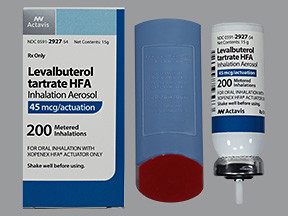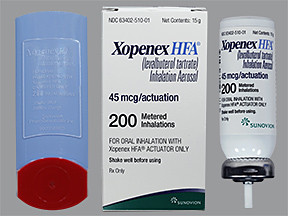LEVALBUTEROL HFA INHALER - ORAL
PHONETIC PRONUNCIATION: (LEV-al-BUE-ter-ol)
COMMON BRAND NAME(S): Xopenex HFA
GENERIC NAME(S): levalbuterol tartrate
Uses
USES: Levalbuterol is used to prevent and treat wheezing and shortness of breath caused by breathing problems (such as asthma, chronic obstructive pulmonary disease). It is a quick-relief drug. Levalbuterol belongs to a class of drugs known as bronchodilators. It works in the airways by opening breathing passages and relaxing muscles. Controlling symptoms of breathing problems can decrease time lost from work or school. This drug is not approved for use in children younger than 4 years due to increased risk of side effects (such as unusual fast breathing, worsening asthma). Ask your doctor or pharmacist for details.
How to use LEVALBUTEROL HFA INHALER - ORAL
HOW TO USE: Read the Patient Information Leaflet provided by your pharmacist before you start using this medication and each time you get a refill. Follow the illustrated directions for the proper use of this medication and proper cleaning of the mouthpiece. If you have any questions, ask your doctor or pharmacist. Shake the canister well before using. Follow the instructions for test sprays in the air if you are using a canister for the first time or if you have not used it for 3 days or more. A fine mist is a sign that the inhaler is working properly. Avoid spraying the medication in your eyes. Inhale this medication by mouth as directed by your doctor, usually every 4 to 6 hours as needed. If two inhalations are prescribed, wait at least 1 minute between them. The dosage is based on your medical condition and response to treatment. Do not increase your dose or use this drug more often than prescribed without your doctor's approval. Using too much of this medication will increase your risk of serious (possibly fatal) side effects. Using a spacer device with the inhaler may help you use this medication properly. Ask your doctor or pharmacist for more information. If a child is using this medication, a parent or other responsible adult may need to help the child use the inhaler properly. If you are using other inhalers at the same time, wait at least 1 minute between the use of each medication. Always have this quick-relief inhaler with you. Keep track of the number of inhalations you use, and discard the inhaler after you have used the labeled number of inhalations on the product package. Also count test sprays used to prime the inhaler. Do not float the metal canister in water to test if any more drug is left in the canister. Learn which of your inhalers you should use every day (controller drugs) and which you should use if your breathing suddenly worsens (quick-relief drugs). Ask your doctor ahead of time what you should do if you have new or worsening cough or shortness of breath, wheezing, increased sputum, worsening peak flow meter readings, waking up at night with trouble breathing, if you use your quick-relief inhaler more often (more than 2 days a week), or if your quick-relief inhaler does not seem to be working well. Learn when you can treat sudden breathing problems by yourself and when you must get medical help right away. Tell your doctor if your symptoms do not improve or if they worsen.
Side Effects
Precautions
Interactions
Overdose
Images
Reviews
Faq for LEVALBUTEROL HFA INHALER - ORAL
Levalbuterol HFA inhaler is a medication used for the treatment of asthma and other breathing difficulties. It contains a medication called Levalbuterol, which belongs to a class of drugs known as bronchodilators.
Levalbuterol HFA inhaler works by relaxing the muscles in the airways, which helps to open them up and improve breathing. It also helps to reduce swelling and inflammation in the airways.
You should follow the instructions provided by your healthcare provider or the instructions on the packaging. Generally, you'll need to shake the inhaler, remove the cap, exhale deeply, place the mouthpiece in your mouth, and then press down on the canister to release a dose of the medication. Breathe in deeply and hold your breath for a few seconds before exhaling slowly.
Common side effects of Levalbuterol HFA inhaler may include headache, nervousness, tremor, rapid heart rate, throat irritation, and cough. If you experience any severe side effects or allergic reactions, seek medical attention immediately.
It's important to inform your healthcare provider about all the medications you are taking, as Levalbuterol HFA inhaler may interact with certain drugs. This includes beta-blockers, diuretics, and other bronchodilators. Your healthcare provider can determine if it is safe for you to use multiple medications together.
Levalbuterol HFA inhaler typically starts working within a few minutes of using it. However, the full effects may not be felt until 1-2 hours after use. It is important to use the inhaler regularly as prescribed by your healthcare provider for optimal results.
It is important to discuss the use of Levalbuterol HFA inhaler with your healthcare provider if you are pregnant or breastfeeding. They will weigh the potential benefits against any potential risks and provide guidance on its use.
Disclaimer
IMPORTANT: HOW TO USE THIS INFORMATION: This is a summary and does NOT have all possible information about this product. This information does not assure that this product is safe, effective, or appropriate for you. This information is not individual medical advice and does not substitute for the advice of your health care professional. Always ask your health care professional for complete information about this product and your specific health needs.


No Reviews Yet